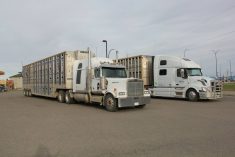BUENOS AIRES, Argentina (Reuters) – Argentine farmers began a strike Aug. 28 and threatened to extend the protest, reviving a dispute over government policy that hit local financial markets and tested president Cristina Fernandez last year.
The measure virtually paralyzed local grain and livestock markets, but is unlikely to cause much disruption to the country’s grain shipments because most exporters and oilseed-crushing plants have sufficient stocks.
Nevertheless, the disruption supported Chicago soybean futures prices last week.
The new round of protests was sparked by the president’s veto of part of a drought-aid law. A severe drought in much of Argentina’s farm areas has slashed wheat output and planting and has heightened anti-government sentiment.
Read Also

Petition launched over grazing lease controversy
Battle continues between the need for generation of tax revenue from irrigation and the preservation of native grasslands in southern Alberta rural municipality.
Farmers say government emergency measures to help them cope with drought have been insufficient or improperly implemented.
“Farmers are really fed up about the lack of policies, the lack of solutions and the drought,” said Pablo Orsolini, vice-president of the Argentine Agrarian Federation (FAA), one of the four farming associations that has led protests that erupted in March 2008 over a tax hike on soybean shipments.
“There are proposals out there for the strike to be until Sept. 8 …. We’ll be deciding this week to see whether to extend it until then or not,” Orsolini said.
Industry analysts say the impact of the strike will be limited because most of Argentina’s soybean crop has already been shipped or stored. The United States will harvest a bumper soybean crop in the next few weeks and buyers are more focused on U.S. supplies and crop conditions.
If the protest drags, buyers could switch to U.S. beans, market analysts say.
“Now they’re talking about extending the strike in Argentina. The longer it goes on, the more potential there is to move exports to us,” said Vic Lespinasse, an analyst at GrainAnalyst.com.
Fernandez backed down on most of her efforts to raise taxes but refused to trim the 35 percent export levy on soybeans, which is Argentina’s top crop and produced almost all for export. She said high profits from soybeans should be taxed to fund social programs and to promote other crops for domestic use.














